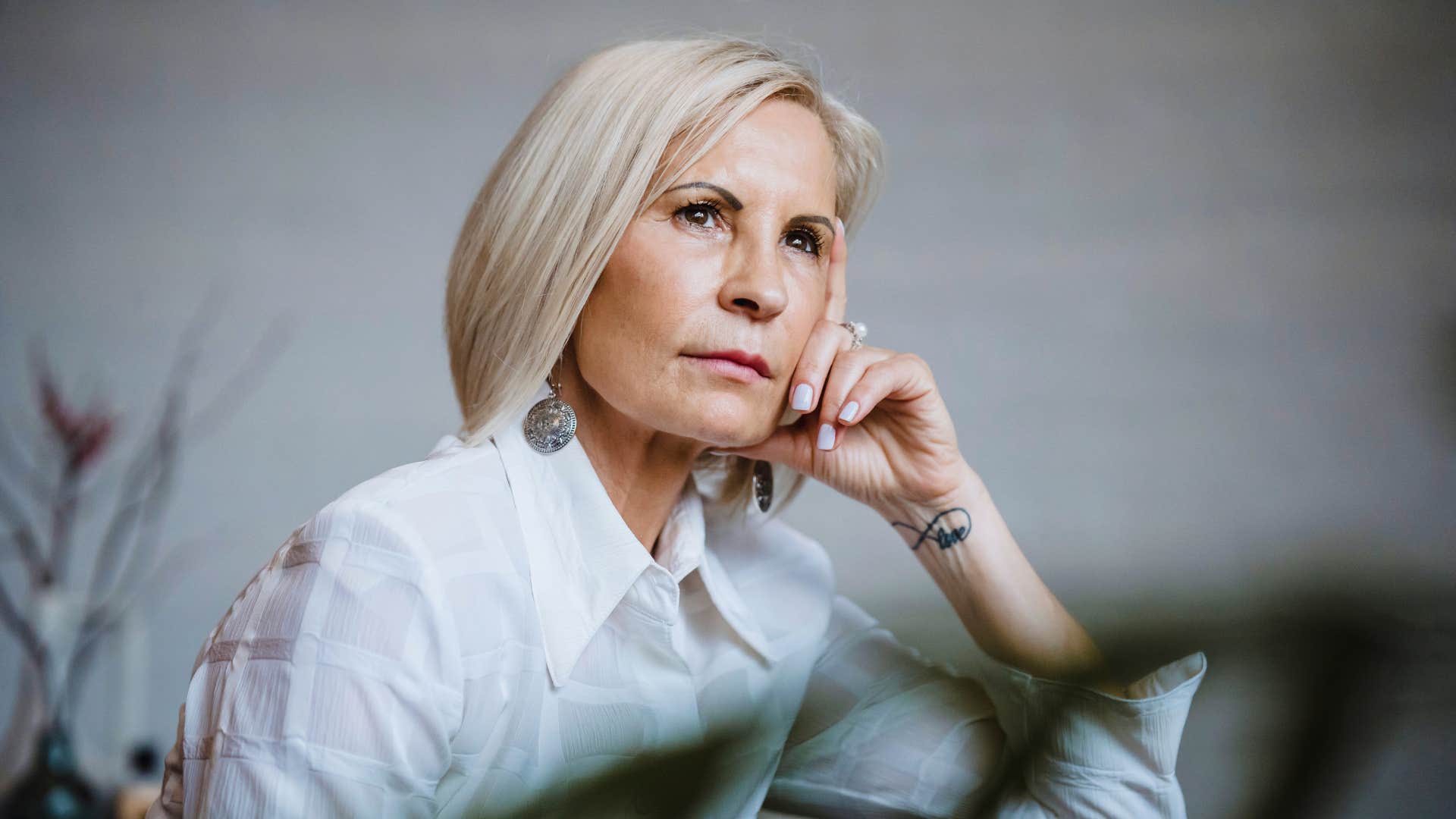11 Subtle Habits Of A Woman Who's Never Been Able To Depend On Anyone
When self-reliance becomes second nature, it leaves a mark in ways many people miss.
 Iuliia Fadeeva / Shutterstock
Iuliia Fadeeva / Shutterstock Some women learn early on that the only person they can count on is themselves. Whether it came from unreliable parents, inconsistent partners, or having no choice but to grow up too fast, they build their lives on self-sufficiency. That kind of independence can look admirable from the outside, but underneath, it often comes from experience that shaped them to be especially cautious.
They don’t usually make a big show of it. In fact, most of the habits of a woman who's never been able to depend on anyway are quiet, subtle signals that they’ve learned to survive without help. You might not notice at first glance, but the way they handle things reveals a lifetime of knowing that support isn’t guaranteed.
These are 11 subtle habits of a woman who's never been able to depend on anyone
1. She always has a backup plan
 Los Muertos Crew from Pexels via Canva
Los Muertos Crew from Pexels via Canva
A woman who's never been able to depend on anyone doesn’t just plan ahead, she plans around failure. If something falls through, she already has an alternative in mind. She’s not exactly pessimistic, but she’s been let down too many times not to be ready.
People who've had only unreliable support systems often overcompensate with extreme preparedness. Because of this, you won’t see her scrambling when something unexpected happens. She’ll calmly adjust course like she knew it was coming.
2. She downplays her needs
 Hannah Nelson from Pexels via Canva
Hannah Nelson from Pexels via Canva
You’ll rarely hear a woman who's never been able to depend on anyone ask for much, and when she does, it will come with disclaimers and apologies. She’s used to being told that her needs are too much or allowing them to go unmet altogether. Over time, she’s learned to shrink herself and her expectations in response.
Being left with unmet emotional needs in childhood often leads to adults who suppress their own desires to avoid rejection. She might act like she’s fine when she’s struggling. It’s just what she’s learned to do, as needing less became a way to protect herself from disappointment.
3. She over-explains when she makes a mistake
 Jacob Lund via Canva
Jacob Lund via Canva
When something goes wrong, she doesn’t just apologize, she lays out the entire context to explain what happened and why. She wants you to understand how hard she tried, how many variables she considered, and what she’ll do differently next time.
That urge often comes from growing up in an environment where being wrong had major consequences. According to trauma research, this kind of hyper-accountability can stem from fear of being blamed or misunderstood.
Even small mistakes weigh heavily on her. She’s trying to stay safe, so you’ll hear all of the nervously explained details before you even think to judge her.
4. She has a hard time delegating
 Timur Weber from Pexels via Canva
Timur Weber from Pexels via Canva
Even if she’s overwhelmed, she rarely asks for help. She'd like to trust people, but she’s never had the luxury to. Letting go of control feels risky for her rather than freeing. People with high self-reliance often find delegation uncomfortable because it triggers anxiety about follow-through. So she keeps doing it all herself, even when it wears her out.
It’s how she learned to operate, and shifting that mindset takes more than just encouragement. She needs to see that support won’t collapse the second she trys to lean on it.
5. She double checks everything
 George Milton from Pexels via Canva
George Milton from Pexels via Canva
Whether it's confirming a time, rereading a text, or revisiting details others would overlook, she’s constantly scanning for what might go wrong. Being thorough is incredibly important for her. When you’ve had to clean up after other people’s mistakes, you start assuming it’s on you to catch any potential problems before they land.
This kind of hyper-vigilance has been linked with past experiences of instability or unpredictability. She’s trying to prevent a mess that no one else will help her fix, not be a perfectionist for perfection's sake. Precision has became her safety net.
6. She keeps her emotions tightly controlled
 simona pilolla via Canva
simona pilolla via Canva
You might notice how composed she stays, even when things feel heavy. She feels deeply like anyone else, but she doesn’t always feel safe expressing it. Early emotional neglect or inconsistent support can lead people to manage their feelings internally as a protective measure.
Emotional suppression is often linked to self-reliance in adults. When others cry or vent easily, she might quietly withdraw instead. She’s spent years learning to carry things silently. To her, staying calm is how you stay standing.
7. She’s financially overcautious
 Aflo Images via Canva
Aflo Images via Canva
She saves aggressively, worries about every expense, and doesn’t like financial surprises. She simply cannot trust that anyone will bail her out if things go sideways.
People who grew up with unstable support systems are more likely to approach money with a strong sense of caution and independence, so you won’t see her living beyond her means, even when she could. She’d rather feel safe than flashy. That mindset doesn’t always come from scarcity, but may also come from the memory of what it felt like to have nothing to fall back on.
8. She keeps her inner circle small
 Jacob Lund via Canva
Jacob Lund via Canva
You might think she’s reserved or distant, but the truth is she’s selective out of necessity. She’s learned that not everyone sticks around, and letting people in too fast often leads to pain. Trust isn’t impossible for her, but it is slow and hard-won.
When she does let someone in, it means something. But don’t expect instant openness. She’s been burned too many times to make that mistake again.
9. She rarely celebrates her own wins
 cottonbro studio from Pexels via Canva
cottonbro studio from Pexels via Canva
Even when she achieves something big, she moves on quickly. Celebration feels vulnerable — like an open invitation for things to fall apart. She’s more comfortable preparing for the next challenge than pausing to enjoy the current one.
You might see her downplay promotions, milestones, or compliments. She probably does care, but she's also learned early that praise often doesn’t last, and sometimes it disappears the second you believe it.
10. She’s always the one checking in
 Kaboompics from Pexels via Canva
Kaboompics from Pexels via Canva
Whether it’s remembering birthdays, sending supportive texts, or asking how someone’s doing, a woman who's never been able to depend on anyone takes responsibility for maintaining relationships. It’s her way of proving she’s reliable, even if she never had anyone do the same for her. Research on adult attachment styles shows that people who didn’t receive dependable care often overfunction in relationships later on.
She’s working hard to be the kind of person she always needed, and if that care isn’t reciprocated, it slowly chips away at her. She may not complain, but it's likely that she’ll quietly retreat.
11. She keeps most people at arm’s length emotionally
 Jacob Lund via Canva
Jacob Lund via Canva
She can be friendly, kind, and easy to talk to, but there’s always a layer of distance you can’t quite cross. That emotional boundary isn’t accidental. It’s something she’s put in place to protect herself from getting too attached to someone who might let her down.
Even if she wants to open up, it takes time. You’ll have to show her, not tell her, that you’re different. And even then, she might only let you in a little at a time.
Executive Editor Arianna Jeret, MA/MSW, is a writer, former family law mediator, and recognized expert on relationships and conflict resolution. Her work has been featured in Cosmopolitan, The Huffington Post, Yahoo, MSN, Bustle, Parents and more.

